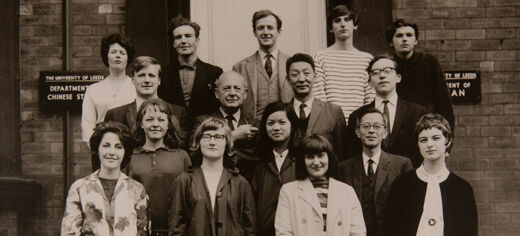
Students past and present are celebrating the 50th anniversary of East Asian Studies at the University of Leeds.
The UK’s first centre for modern Chinese studies welcomed its initial cohort in the autumn of 1963. Known then as the Department of Chinese Studies, it has since expanded to include Mongolian, Japanese, Thai, South-East Asian and Asia-Pacific Studies.
Professor Caroline Rose, Director of East Asian Studies (EAS), said: "We have built up and maintained a reputation for being a leading centre for modern Chinese and East Asian studies. The quality and breadth of the expertise and research in East Asian Studies is embodied by the high calibre graduates who have left us and gone on to achieve great things across the world.
"There is a certain kudos attached to being able to say ‘I’m a graduate of East Asian Studies at Leeds’ – people, including employers, know they are dealing with graduates who have a high level of fluency and a nuanced understanding of the region."
More than 2,000 students have graduated from EAS at Leeds over the years and have gone on to succeed in a wide range of careers. Many will return to Leeds for a long weekend of celebratory events from Thursday (October 24), which include an open day on Saturday (October 26), exhibitions and talks by alumni (see below for more details).
An anniversary reception on Friday evening (October 25) will see University of Leeds Vice-Chancellor Sir Alan Langlands and East Asian Studies staff welcome senior diplomats and staff from the British Council, Sino-British Fellowship Trust, Great Britain China Centre and China Britain Business Council – among other key international organisations – as well as other alumni and VIPs.
Sir Alan Langlands said: "East Asia has grown in importance on the world stage since the early 1960s and East Asian Studies at the University of Leeds has grown in stature with it.
"It is the region that is leading the global economy in the 21st century and the University – both through East Asian Studies and its Business School – remains at the forefront of research and education, ensuring that our students are well-placed to contribute to the exciting developments in this part of the world."
Emeritus Professor Don Rimmington, one of EAS’ original members of staff and a former head of department, said: "The Department of Chinese Studies at Leeds in 1963 launched a totally new degree in Chinese Studies, which focused on modern China and the modern language. All the other departments at the time taught degrees in Sinology, with a major emphasis on Classical Chinese.
"Our undergraduate numbers increased rapidly in the 1970s, exceeding by some distance those at other Asian Studies Departments. Over the last 20 years we have also developed a series of graduate programmes, many of these in association with the University's Business School."
Today, East Asian Studies at Leeds is a key part of the White Rose East Asia Centre, an Arts and Humanities Research Council and British Academy-funded collaboration with the Centre for International Business at the University of Leeds and the School of East Asian Studies at the University of Sheffield. The programme aims to build national capacity in language-based area studies.
An adventurous founder
As part of the weekend’s celebrations, there will also be a celebration of the fascinating life of founding professor, Owen Lattimore.
Professor Lattimore, an American scholar and frontier explorer, grew up in China apart from spells at schools in Switzerland and Cumbria. He did not go to college but instead returned East and ended up roaming in Mongolia and western China for a couple of years.
During the Second World War he was US President Franklin D. Roosevelt's appointed personal political adviser to the Chinese wartime leader Chiang Kai-shek, and later the Director of Pacific Operations in the Office of War Information in San Francisco.
Infamy came in 1950 when Senator McCarthy accused him of being "the top Soviet espionage agent in the United States". He was eventually exonerated.
Fluent in Chinese, Mongolian, Russian and French – Professor Lattimore was teaching international relations at John Hopkins University when he agreed to make the move to England in 1963 to establish Chinese Studies at Leeds. One of his duties around this time was to interpret for the Queen. He retired from the post in 1975 and died in 1989.
Other events planned for the anniversary celebrations include:
- a photographic exhibition and talk by former Reuters correspondent and photojournalist Peter Griffiths. Mr Griffiths read Chinese at Leeds from 1967-1971 and was Peking correspondent from 1974-1977, covering the deaths of Mao and Chou En-lai and the Ching Ming incident – among other things
- talks by alumni on their various careers (eg diplomatic service, journalism, politics and finance)
- guided tours of related exhibitions – including Pheonixes and Dragons, with stunning late Qing dynasty costumes, organised jointly with the University of Leeds International Textiles Archive (ULITA) – and an exhibition by Chinese fashion photographer Chen Man
- performances by students of Beijing Opera, Thai dance and Japanese pop
- on Sunday, the Owen Lattimore Memorial Bike Ride: a leisurely 25-mile round trip to Linton, where Professor Lattimore lived during some of his time at Leeds. Even in his 60s he often cycled from here into work.
Further information
Current and founding staff from East Asian Studies are available for interview. Please contact Gareth Dant, Press Officer, on 0113 343 3996 or email g.j.dant@leeds.ac.uk.